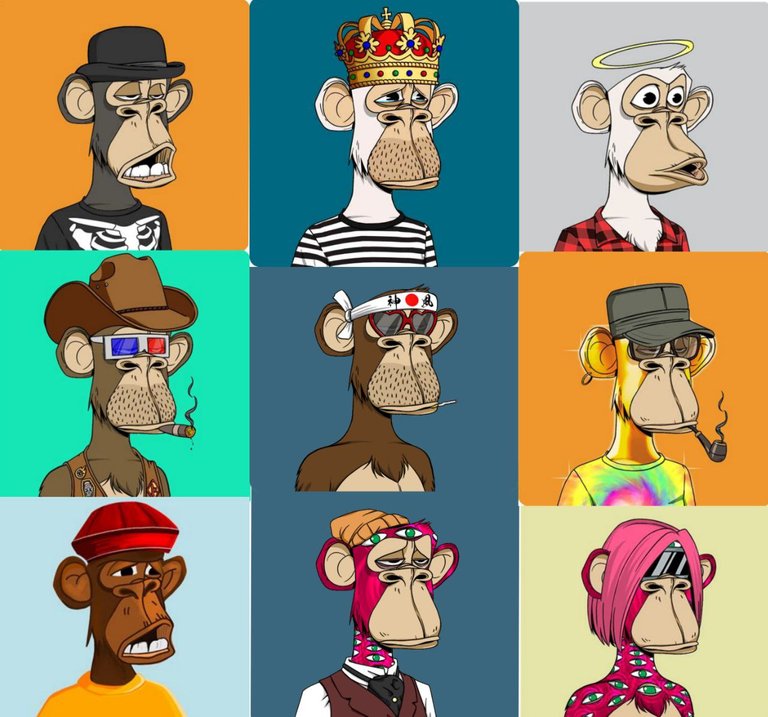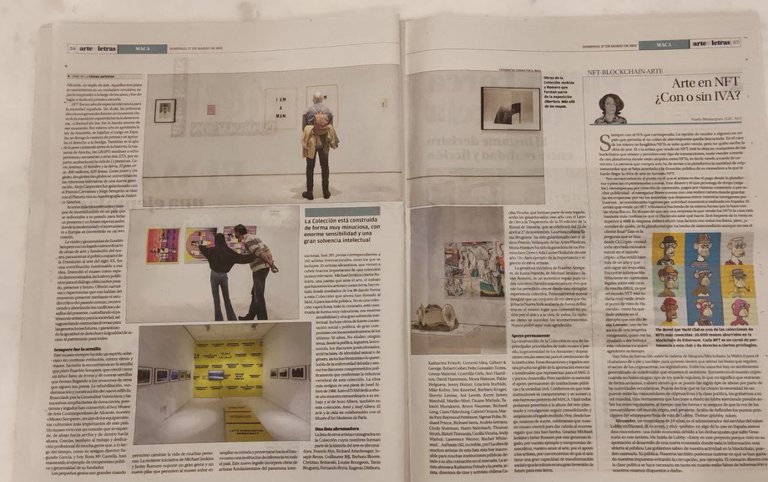
Siempre con el IVA que corresponda. La opción de vender a alguien en un país que permita el no cobro de este impuesto queda descartada. En el caso de los tokens no fungibles/NFTs se sabe quién vende, pero no quién recibe la obra de arte. El o la artista que vende un NFT, esté la obra en cualquiera de las bockchains que existen y permiten este tipo de transacciones, suele vender a través de una plataforma donde están alojados estos NFTs, es decir, vende a través de un tercero. La persona que compra solo ha de enviar a la plataforma la cantidad de criptomonedas que se haya acordado y la dirección pública de su monedero a la que le harán llegar la obra de arte en formato NFT.
Nos encontramos en el punto en el que el artista recibe el pago desde la plataforma y pasa las criptomonedas a euros. Este dinero y el que provenga de drops (regalos), recompensas por creación de contenido, pagos por visionar contenido o por recibir publicidad- el navegador Brave cuenta con
una wallet/cartera donde guardar las recompensas por ver los anuncios que dejamos entrar mientras navegamos por Internet-, se considerarán ingresos por actividad económica realizada en España. El artista que vende un NFT tributará a Hacienda de la misma forma que lo hace con las obras físicas.
En el caso de que sea una empresa la que vende los NFTs la cosa está bastante más confusa ya que ni Hacienda sabe qué hacer. Si el importe de la venta es superior a 400€ la empresa deberá emitir una factura con todos los datos, pero, ¿a nombre de quién, de la plataforma que ha hecho de intermediario aunque no sea el cliente final? Ésta es la pregunta que se hizo desde CLCripto -consultoría centrada exclusivamente en el mundo cripto- a Hacienda hace más de un año y que aún sigue sin respuesta. Encontrar información fehaciente en cuestiones legales sobre este mundo resulta difícil, ya que “el mundo NFT está todavía muy verde desde el punto de vista de Hacienda”, como ha quedado patente en el ejemplo que nos dio Jesús Lorente, uno de los socios de esta empresa zaragozana, quien me ha ayudado a dar forma a esta columna y a quien agradezco su tiempo.
Hay falta de fomación sobre la cadena de bloques/blockchain, la Web3.0 para el ciudadano de a pie y también para quienes tienen que sentar las bases que regulen el sector de los criptoactivos, los legisladores. Entre los usuarios hay un sentimiento generalizado de indefensión que enrarece el
ambiente. Entraron en el mundo cripto cuando no había ningún tipo de ley que lo regulara, lo que no significa que entraran de forma anónima, y ahora temen que se pueda dar algún tipo de abuso por parte de las autoridades económicas. Podría decirse que se ha creado la necesidad de un puente
entre los consumidores de criptoactivos y la clase política, los gobiernos a nivel mundial. Una herramienta que funcione a modo de lobby ejerciendo presión sobre los entes reguladores, al tiempo que los forma y se asegura de que la voz de los consumidores del mundo cripto, está presente. Acabo de definirles los puntos principales del whitepaper/hoja de ruta de Lobby,-Twitter
“Estoy en este proyecto porque creo en su aportación al desarrollo de una nueva economía donde toda la información está abierta al público. Los gobiernos saben de nuestra actividad en la blockchain, pueden rastrearla. Es pública. Nosotros también podemos rastrear en qué se han gastado nuestros impuestos evitando la corrupción, por ejemplo. El contacto directo con la clase política se hace necesario en tanto en cuanto están faltos de información y nosotros estamos dispuestos a darla”.
Nuria Menargues (GiC Art)
@lobby_token. Alexander, un venezolano de 24 años, es el administrador del servidor del token Lobby en Discord. Sí, es joven, y muy “puesto” en algo de lo que en España somos desconocedores: una doble economía debido a los desvarajustes que sufre Venezuela en este ámbito. Me habla de Lobby:
Always with the applicable VAT. The option of selling to someone in a country that does not allow VAT to be charged is ruled out. In the case of non-fungible tokens/NFTs, it is known who is selling, but not who is receiving the artwork. The artist who sells an NFT, whether the work is on any of the existing bockchains that allow this type of transaction, usually sells through a platform where these NFTs are hosted, i.e. he or she sells through a third party. The person who buys only has to send the platform the amount of cryptocurrencies that has been agreed and the public address of their wallet to which they will receive the work of art in NFT format.
We are at the point where the artist receives payment from the platform and converts the cryptocurrencies into euros. This money and the money that comes from drops (gifts), rewards for content creation, payments for viewing content or for receiving advertising - the Brave browser has
a wallet to store rewards for viewing advertisements that we let in while browsing the Internet -, will be considered income from economic activity carried out in Spain. The artist who sells an NFT will be taxed by the tax authorities in the same way as they do with physical works.
In the case of a company selling the NFTs, the situation is much more confusing, as even the tax authorities do not know what to do. If the amount of the sale is more than €400, the company must issue an invoice with all the details, but in whose name, the platform that has acted as an intermediary even if it is not the end customer? This is the question that CLCripto -a consultancy focused exclusively on the crypto world- asked the tax authorities more than a year ago and which is still unanswered. Finding reliable information on legal issues in this world is difficult, as "the NFT world is still very green from the Treasury's point of view", as was made clear in the example given by Jesús Lorente, one of the partners of this company from Zaragoza, who helped me to shape this column and to whom I am grateful for his time.
There is a lack of awareness of blockchain/blockchain, the Web3.0 for ordinary citizens and also for those who have to lay the foundations for regulating the crypto-asset sector, the legislators. Among users, there is a general feeling of helplessness that is making the
atmosphere. They entered the crypto world when there was no law regulating it, which does not mean that they entered anonymously, and now they fear that there could be some kind of abuse by the economic authorities. Arguably, a need has been created for a bridge
between the consumers of crypto-assets and the political class, governments worldwide. A tool that functions as a lobbying tool, exerting pressure on regulators, while educating them and making sure that the voice of consumers in the crypto world is present. I have just outlined for you the main points of Lobby's whitepaper/roadmap,-Twitter
"I am in this project because I believe in its contribution to the development of a new economy where all information is open to the public. Governments know about our activity on the blockchain, they can track it. It is public. We can also track what our taxes have been spent on, avoiding corruption, for example. Direct contact with the political class is necessary insofar as they lack information and we are willing to give it".
Nuria Menargues (GiC Art)
@lobby_token. Alexander, a 24-year-old Venezuelan, is the server administrator of the Lobby token on Discord. Yes, he is young, and he is very "into" something that we in Spain are unaware of: a double economy due to Venezuela's imbalances in this area. He talks to me about Lobby:

Ésta es la pregunta que se hizo desde CLCripto -consultoría centrada exclusivamente en el mundo cripto- a Hacienda hace más de un año y que aún sigue sin respuesta. Qué sorpresa...
Estamos en buenas manos #ironicON 🤗
👏
Gracias 🙏